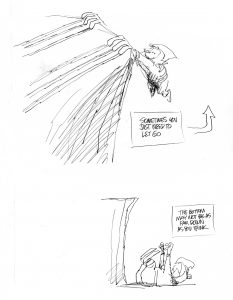Letting Go
More on Test #1 – Letting Go
With these endings there will be some degree of loss, sometimes a big loss and sometimes not so big. Sometimes the loss happens all at once and sometimes it happens slowly over time. If we use relationships as an example the differences are clear. You will probably have some relationships where you and your friend just drift apart as your lives take you different directions. On the other hand, the break-up with a close friend or a girl/boyfriend can be intense and happen from one day to the next. Your changing relationship with your parents will probably have elements of slow evolution and some elements of abrupt change. Your changing identity will have a lot of those evolutionary endings and a few more noticeable endings.
Some endings can be wrenching with a lot of struggle and can be really painful. Other endings might be just a matter of gently letting go.

Elisabeth Kubler-Ross
The Stages of Letting Go
Elisabeth Kubler-Ross is a person who studied how people reacted to loss, particularly in regard to death and dying. She proposed that people go through five stages in coming to accept a major loss.
Her work is useful in understanding that letting go is a process and it has stages that can each have an important purpose. These are important stages for people to go through whether as teenagers, in adult life, in corporate change or community change.
| Stage | Why Each Stage is Valuable |
| 1
Denial |
“Nope, not happening – no loss or ending here – no problem – no grieving necessary.” As annoying as denial can be it really has a function. It allows people to get over a shock or prepare themselves to deal with the ending. There may also be so much going on in their lives that they just need to focus elsewhere. |
| 2
Anger |
As people come out of denial they often get angry. Anger can be scary, but at least people are emerging from denial and are available to engage with. Anger is sometimes people’s way to exercise power in the face of a loss they are powerless to prevent. Anger is problematic when it is too extreme or goes on for too long. |
|
3 Bargaining |
This is the next stage and the teenage years are full of bargaining – with each other, with parents, with teachers. It’s particularly common with parents as the parent-child relationship ends and everyone searches for the new healthy relationship. The classic scenario is a teenager wanting freedom and independence, but also wanting their laundry done, transport on demand, money available, no chores and favorite foods available without having to ask for them – let alone go get them. The good news is that bargaining is a way for people to be connected and to figure out what they can create to follow what has ended. |
|
4 Depression |
Some depression can happen when it becomes clear that there really is an ending or loss and bargaining isn’t going to prevent it. This feeling can range from sadness to full depression depending on the person and the loss (or losses). It’s a natural response to endings and is only problematic when it is too intense of lasts for too long. |
|
5 Acceptance |
Acceptance can happen because something comes along to take the place of what ended or because a person has simply come to terms with the loss and is ready to move on. Acceptance can range from a tremendous sense of relief and freedom to a quieter very subtle move away from the sadness or depression. At this point a person is ready and open to something new. |
